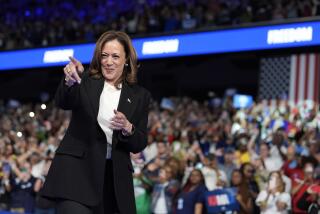The price of our early primary
- Share via
Tuesday’s primary election cost the state and counties an estimated $100 million, and it produced the lowest turnout since records have been kept. Less than 25% of registered California voters bothered to vote, according to the secretary of state’s office.
The turnout was so dismal because the state’s presidential primary had been split off and moved up to Feb. 5. Democrats and Republicans said the change was necessary so that California could play a role in choosing the two parties’ presidential nominees. Usually by the time California’s regular June primary rolls around in presidential election years, the nominees have already been selected. Indeed, the last time the state played a significant part in choosing a nominee was in 1984, when Gary Hart’s defeat of Walter Mondale helped revive his flagging campaign.
But adding insult to the injury of last week’s historically low turnout, California’s effect on the presidential nominating fights turned out to be minimal, as 24 states voted on that same day in what amounted to a national primary. (And if the state’s presidential primary had been held on its original June 3 date, California, with its 441 Democratic delegates, would have been the kingmaker in the drawn-out and closely fought race between Barack Obama and Hillary Rodham Clinton.)
Here’s the final indignity. The notion of giving California a bigger say in the presidential nominating primaries was just a sales pitch. The real reason that Gov. Arnold Schwarzenegger teamed up with Democratic legislative leaders last year to move up the primary was to allow Democrats to qualify an initiative that would have changed the state’s term-limits law. If Proposition 93 had passed, termed-out legislators, among them then-Assembly Speaker Fabian Nuñez and Senate Pro Tem President Don Perata, would have been able to extend their careers in the Legislature.
Well, the term-limits initiative went down to defeat.
Schwarzenegger’s decision to peel off the state’s presidential primary from the June 3 primary has now come back to haunt him. Part of the deal was that Democrats would pair a redistricting-reform plan, a goal long sought by the governor, with the term-limits measure. The Democrats promised that they would take the map-drawing power out of the hands of the Legislature and give it to nonpoliticians. Advocates of such reform contend that the change would produce more politically balanced districts, which, in turn, would elect more moderate candidates who would be less beholden to organized labor and other interest groups in the Legislature.
The Democrats broke their promise, and Tuesday’s record low turnout did not produce the moderate candidates that Schwarzenegger needs to get things done in the Legislature. Consider:
* In San Diego County’s 78th Assembly District, a classic primary fight between a Democratic liberal, Marty Block, and Democratic moderate Maxine Sherard, was settled by just 400 votes, with Block winning.
* In San Mateo County, the more liberal Gerald Hall, though clinging to a small lead over moderate Gina Papan, was expected to win in the 19th Assembly District.
* In the Sacramento area, the more liberal Democratic candidate, Mariko Yamada, defeated the more moderate Christopher Cabaldon by slightly more than 1,000 votes in the 8th Assembly District.
Organized labor’s track record was truly impressive Tuesday. The Service Employees International Union was victorious in all of its competitive Assembly primary fights. The California Teachers Assn. also won big, successfully backing Yamada as well as Robert Blumenfield in the 40th Assembly District, which includes much of the San Fernando Valley. Labor’s one defeat was in the state Senate primary contest in the 25th District, where Roderick Wright bested 82-year-old Mervyn Dymally.
Would any of these races have turned out differently if the vote had been in February, when the Democratic and Republican presidential races brought nearly 58% of eligible voters to the polls? Most political analysts say lower-turnout elections mean that a higher percentage of more partisan voters from both parties come to the polls.
But we will never know the answer to that question.
What we do know is that Schwarzenegger faces a more polarized Assembly in his final two years in office, and the power of interest groups, particularly organized labor, will likely strengthen in the Legislature come November.
What a deal.
Anthony York is the editor of Capitol Weekly, a newspaper of California government and politics.
More to Read
Get the L.A. Times Politics newsletter
Deeply reported insights into legislation, politics and policy from Sacramento, Washington and beyond. In your inbox three times per week.
You may occasionally receive promotional content from the Los Angeles Times.










